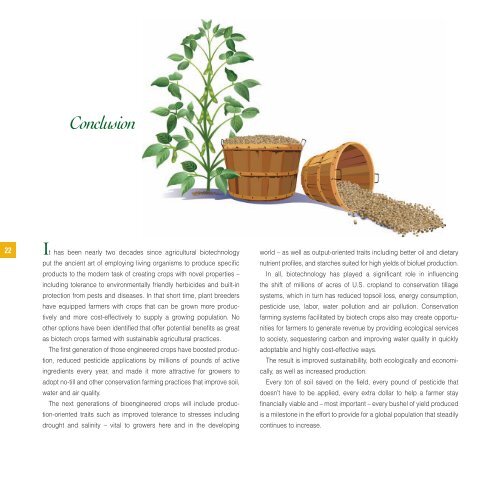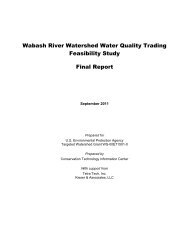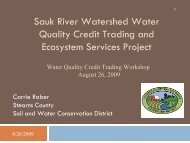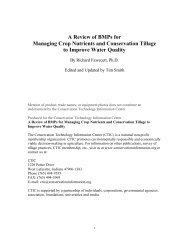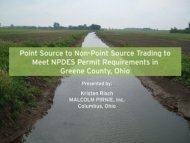Facilitating Conservation Farming Practices and Enhancing ...
Facilitating Conservation Farming Practices and Enhancing ...
Facilitating Conservation Farming Practices and Enhancing ...
You also want an ePaper? Increase the reach of your titles
YUMPU automatically turns print PDFs into web optimized ePapers that Google loves.
Conclusion<br />
22<br />
It has been nearly two decades since agricultural biotechnology<br />
put the ancient art of employing living organisms to produce specific<br />
products to the modern task of creating crops with novel properties –<br />
including tolerance to environmentally friendly herbicides <strong>and</strong> built-in<br />
protection from pests <strong>and</strong> diseases. In that short time, plant breeders<br />
have equipped farmers with crops that can be grown more productively<br />
<strong>and</strong> more cost-effectively to supply a growing population. No<br />
other options have been identified that offer potential benefits as great<br />
as biotech crops farmed with sustainable agricultural practices.<br />
The first generation of those engineered crops have boosted production,<br />
reduced pesticide applications by millions of pounds of active<br />
ingredients every year, <strong>and</strong> made it more attractive for growers to<br />
adopt no-till <strong>and</strong> other conservation farming practices that improve soil,<br />
water <strong>and</strong> air quality.<br />
The next generations of bioengineered crops will include production-oriented<br />
traits such as improved tolerance to stresses including<br />
drought <strong>and</strong> salinity – vital to growers here <strong>and</strong> in the developing<br />
world – as well as output-oriented traits including better oil <strong>and</strong> dietary<br />
nutrient profiles, <strong>and</strong> starches suited for high yields of biofuel production.<br />
In all, biotechnology has played a significant role in influencing<br />
the shift of millions of acres of U.S. cropl<strong>and</strong> to conservation tillage<br />
systems, which in turn has reduced topsoil loss, energy consumption,<br />
pesticide use, labor, water pollution <strong>and</strong> air pollution. <strong>Conservation</strong><br />
farming systems facilitated by biotech crops also may create opportunities<br />
for farmers to generate revenue by providing ecological services<br />
to society, sequestering carbon <strong>and</strong> improving water quality in quickly<br />
adoptable <strong>and</strong> highly cost-effective ways.<br />
The result is improved sustainability, both ecologically <strong>and</strong> economically,<br />
as well as increased production.<br />
Every ton of soil saved on the field, every pound of pesticide that<br />
doesn’t have to be applied, every extra dollar to help a farmer stay<br />
financially viable <strong>and</strong> – most important – every bushel of yield produced<br />
is a milestone in the effort to provide for a global population that steadily<br />
continues to increase.


